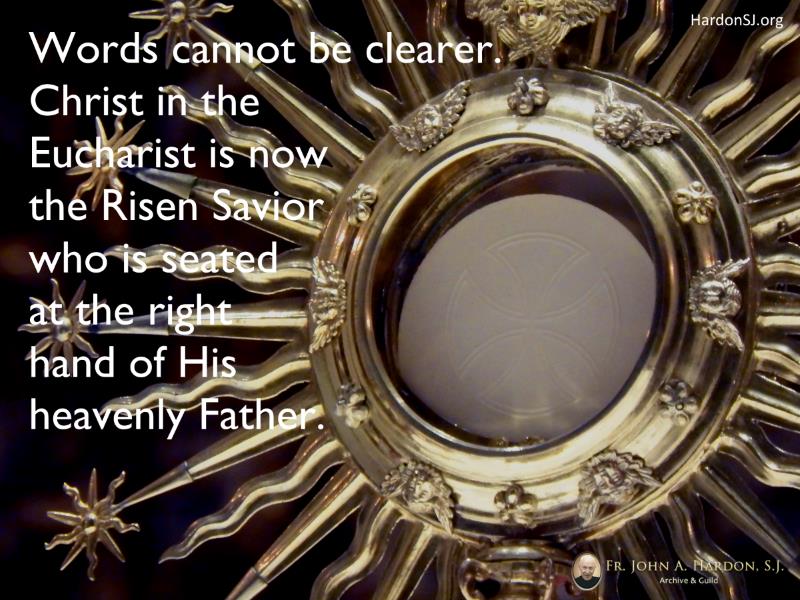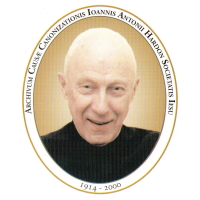by Fr. John A. Hardon, S.J.
We do not usually associate Easter and the Holy Eucharist. But we should. Our faith tells us that God became man in order that, by His death on the Cross, He might redeem the world. But this same faith tells us that, when Christ died on Calvary, the Church came into existence. We may therefore say that we were delivered from sin by the Savior’s death, and receive the blessings of His grace through the Mystical Body which came into being the moment Jesus expired on Good Friday.
But our Catholic Faith tells us even more. Saint Thomas Aquinas raised the question, “Whether Christ’s Resurrection is the cause of the resurrection of our bodies?” He answers in the affirmative. His logic is that whatever is first in any order, is the cause of all that comes after it. Since Christ’s Resurrection was first in the order of our resurrection, it must be the cause of our rising from the dead. To prove his point he quotes from Saint Paul, “Christ is risen from the dead, the first fruits; for by a man came death, and by a man the resurrection of the dead” (1 Corinthians 15:20-21).
St. Thomas goes on to explain that this is perfectly reasonable. Thus we read what Christ Himself says, “As the Father raises up the dead, and gives life; so the Son also gives life to whom He wills” (John 5:21). It is part of the divinely established natural order that every cause operates first on what is nearest, and through it upon others, which are more remote. For example, fire first heats the nearest air, and through it heats bodies that are further off. Consequently the Word of God first bestows immortal life upon that Body which is naturally united with Himself, and through it works the resurrection in all other bodies. Without apology for this long paraphrase from the Summa Theologica, we now get back to the subject of this article, on Easter and the Eucharist.
The Eucharist is the Risen Christ
At the Last Supper, when Christ pronounced the words, “This is my Body” this is the chalice of my Blood,” the Body and Blood that were to be nailed to the Cross and shed on Calvary. As some of the Church’s earliest commentators explain, on Easter Sunday night when Jesus sat down with the disciples at Emmaus, they recognized Him in the “breaking of bread,” which was the Eucharist.
Since the Resurrection of Christ, the Holy Eucharist is indeed the true, living Body and Blood of Christ. But it is now the Risen Christ in His glorified humanity. What are we saying? We are affirming an article of the Catholic faith. In the late eleventh century, when the monk Berengarius denied the Real Presence, he was told to profess what has since come to be known as the Eucharistic Creed:
I believe in my heart and openly profess that the bread and wine placed upon the altar are, by the mystery of the prayer and words of the Redeemer, substantially changed into the true and life-giving flesh and blood of Jesus Christ the Lord, and that after the consecration, there is present the true Body of Christ which was born of the Virgin and offered up for the salvation of the world, hung on the cross and now sits at the right hand of the Father, and that there is present the true blood of Christ which flowed from His side. They are present not only by means of a sign and of the efficacy of the Sacrament, but also in the very reality and truth of their nature and substance (Gregory VII, 1079).
Words cannot be clearer. Christ in the Eucharist is now the Risen Savior who is seated at the right hand of His heavenly Father and will come on the last day to judge the living and the dead.
Grace Through the Risen Humanity of Christ
The whole letter of Saint Paul to the Hebrews stresses the eternal priesthood of Jesus Christ. God became man to redeem us from our sins by His death on the cross. But He continues to exercise His priesthood by communicating the graces He won for us on Calvary. Centuries before Berengarius denied the Real Presence, Nestorius, the heretical patriarch of Constantinople, claimed that Christ was really two persons, one human and the other divine. On these terms, the second Person of the Trinity did not assume a human nature but became “just another man who was born of a woman.” Nestorius further held that Christ offered the sacrifice of Himself not only for our sins but also for His own. In other words Christ was sinful and therefore in need of His own redemption. This, by the way, is one of the basic premises of Islam, which denies that Mary is the Mother of God, since her Son is not the Son of the living God.
Nestorius was condemned by the Council of Ephesus in 431 A.D. Nestorianism has deeply penetrated professedly Christian cultures. It undermines the salvific work of Christ by denying that His humanity was the source of our redemption and still is the channel of our sanctification. As Nestorius put it, “The flesh of the Lord is not life-giving because it does not belong to the very Word of God (who is a human person) and who was linked with God by dignity, and in whom the Godhead had a divine indwelling.”
The Council of Ephesus countered by emphasizing the role of Christ as the great sacrament of the New Law, declaring that “His flesh is lifegiving because it was appropriated by the Word to give life to all things.” The Savior as God is the creator of supernatural life, and as man (united with the divinity) He is the unique channel by which this life is communicated to mankind.
From all that we have just said, we begin to see how important, not to say indispensable, is the Eucharist as a channel of grace to the human race. Once we see that the risen humanity of Christ is the divinely ordained instrument by which supernatural grace is communicated to us, we begin to understand how necessary is the Holy Eucharist for all mankind.
The Three-fold Sacrament of the Eucharist
Pope John Paul II will go down as one of the greatest minds in the history of the papacy. It was John Paul who explained at length that the Eucharist is a sacrament three times over. It is the Sacrifice-Sacrament of the Mass, the Communion-Sacrament of Holy Communion, and the Presence-Sacrament of the Real Presence.
On all three levels, the Eucharist is the Risen Jesus Christ whose humanity is a channel of divine grace to the world. It is impossible to exaggerate the importance of this truth of our faith. Even as we say this, we must remember that the Holy Eucharist is Jesus Christ who rose from the dead on Easter Sunday.
Sacrifice-Sacrament. The Risen Christ offers Himself during the double consecration in the Sacrifice of the Mass. He is on the altar as the Incarnate God in His human nature. He can no longer die a bodily death because He is now in His glorified Body. But He is ready to die because He has a truly human will by which He would die if He could.
We define sacrifice as the voluntary surrender of something precious to God. In the Mass, Christ makes a voluntary surrender of His human life to His heavenly Father.
Unlike Calvary, in the Mass Christ is offering us along with Himself to His heavenly Father. On our part we are to surrender our wills to the will of God in order to benefit from the graces which the Sacrifice of the Mass confers on the whole human race.
What is the distinctive grace that we receive from the Eucharistic Sacrifice? It is the grace to surrender our wills constantly to the mysterious and often demanding will of God.
Communion-Sacrament. In Holy Communion, the Risen Christ gives us Himself in the fullness of His divinity and humanity. The benefits of Holy Communion are beyond human calculation. When we receive our Lord, He strengthens our supernatural life, He gives us the ability to resist the unruly passions of our fallen human nature, He increases our virtues of faith, hope and charity, He removes the guilt of our venial sins and reduces the temporal punishment due to our forgiven sins.
One more effect of Holy Communion needs to be stressed. Receiving our Risen Lord is a promise and assurance of our own bodily resurrection on the Last Day. Saint John records the promise, when the Jews asked themselves, “How can this man give us His flesh to eat?”
Jesus therefore said to them, “Amen, Amen, I say to you, unless you eat the flesh of the Son of Man and drink His blood, you shall not have life in you. He who eats my flesh and drinks My blood has life everlasting and I will raise Him up on the last day” (John 6:53-55).
This is Christ Himself assuring us that the reception of His risen Body in Holy Communion is the guarantee of our own glorious resurrection from the dead.
Presence- Sacrament. During His visible presence in Palestine, Christ did mainly two things: He preached God’s truth to the people and performed many miracles. Moreover, He foretold that those who believed in Him would witness even greater miracles in the future.
In the Blessed Sacrament, it is the same divine Teacher and the same Miracle Worker who taught and worked wonders during His visible stay before His ascension into heaven. All that is necessary on our part is to believe. Remember what the evangelist tells us in the Gospels? There were places in Palestine where the Savior was unable to convince the people of His teaching and unable to work miracles. Why? Because of their lack of faith.
With resounding emphasis the situation has not changed in our day. Jesus Christ is on earth in every tabernacle where the Blessed Sacrament is reserved, and on every altar where the Holy Eucharist is exposed for the adoration of the faithful. But we must be faithful. We must be full of faith. The measure is our belief that Jesus Christ is now on earth in the Holy Eucharist. In the measure that we believe in His Real Presence, He will teach us the truth, and work miracles in our favor, even greater than the wonders He had performed during His visible stay in Asia Minor.
You might want to also read: How to Cope with Abuses in the Eucharistic Liturgy.
Read also: They Anointed Many Sick People with Oil and Cured Them.
Father Hardon is the Executive Editor of The Catholic Faith magazine.
Copyright © 2003 Inter Mirifica

